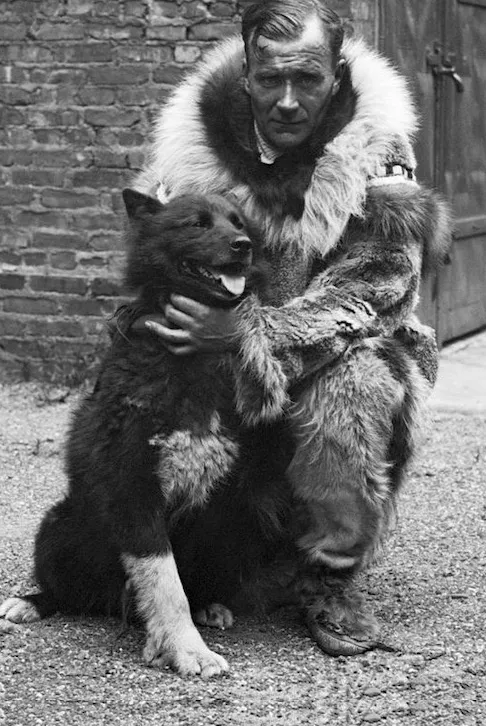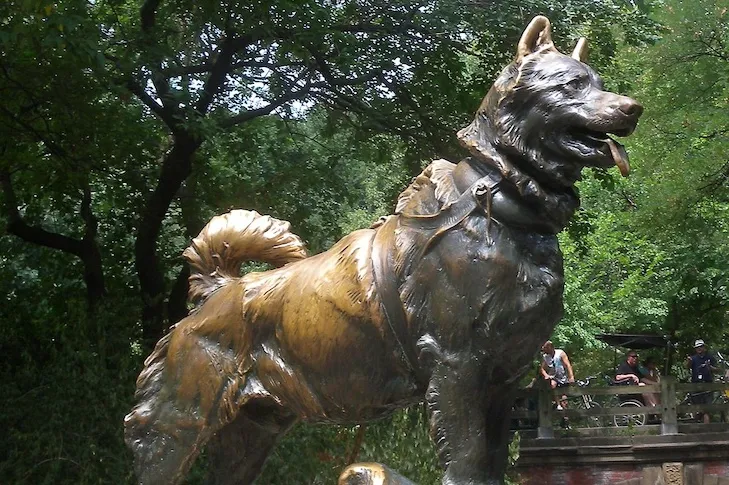In the annals of canine heroism, few tales resonate as powerfully as The Story Of Balto, the courageous sled dog who captured the hearts of a nation. His name became synonymous with bravery, teamwork, and unwavering determination during one of America’s most perilous missions: the 1925 serum run to Nome, Alaska. This epic journey, often referred to as the “Great Race of Mercy,” saw a relay of mushers and their powerful sled dog teams brave the harshest conditions imaginable to deliver life-saving medicine.
The year was 1925, and a silent killer was sweeping through the isolated town of Nome, Alaska. Doctors had identified a rapidly spreading diphtheria epidemic, a highly contagious and often fatal bacterial infection, particularly dangerous for children. With the nearest supply of antitoxin serum located more than 500 miles away in Anchorage, and winter’s icy grip making conventional travel impossible, Nome faced a dire prognosis. Temperatures plunged to a brutal 50 degrees below zero, and relentless snow and ice storms rendered planes grounded and ships frozen in the Bering Sea. The only viable path was the treacherous, 650-mile freight route known as the Iditarod Trail, a frozen wilderness connecting Nome to the railroad station in Nenana. Normally, a dog sled journey along this route would take approximately a month – far too slow to avert the imminent disaster that threatened the lives of thousands.
The desperate situation called for an extraordinary solution: a relay. Twenty brave mushers, alongside their remarkable dog teams, volunteered for this monumental endeavor. Among them was Leonhard Seppala, a legendary musher renowned for his exceptional sled dogs – robust Siberian Huskies directly imported from Siberia. Seppala entrusted his most experienced and intelligent dog, 12-year-old Togo, to lead his team, tackling the longest and most perilous stretch of the journey. Another musher, Gunnar Kaasen, placed his faith in a younger, less experienced three-year-old dog named Balto to lead his team, which would ultimately complete the final leg.
The precious serum embarked on its harrowing journey from Nenana on January 27, swiftly transferred from one sled to another. Each team covered segments ranging from 24 to 52 miles, battling against blinding blizzards, treacherous ice, and unforgiving cold. The coordinated effort demanded immense courage and resilience from both mushers and dogs alike. The stakes were incredibly high, with the fate of an entire town hanging in the balance, making every mile covered a race against time and death.
 Balto with musher Gunnar Kaasen, captured during a momentous period
Balto with musher Gunnar Kaasen, captured during a momentous period
Balto’s final leg of the journey was perhaps the most iconic. Despite his relative inexperience, Balto rose to the monumental challenge, demonstrating an incredible sense of direction and unwavering determination. He navigated through a ferocious blizzard where visibility was almost zero, famously keeping his team on course even when fierce winds lifted the sled and dogs high into the air. His uncanny ability to stay on the trail, relying purely on instinct, was pivotal. Gunnar Kaasen and Balto’s team charged into Nome just before dawn on February 2, completing their leg and the entire relay in an astonishing 127.5 hours – a mere five days, an unimaginable feat given the conditions.
While Balto became the celebrated symbol of this life-saving effort, it was a collective victory fueled by the hearts, hands, and paws of many. Togo, Leonhard Seppala’s lead dog, actually covered the longest and most dangerous segment of the relay, proving his extraordinary endurance and leadership. Yet, Balto, leading the final triumphant sprint into Nome, became the embodiment of the entire endeavor—a testament to teamwork, unparalleled courage, relentless tenacity, and a beacon of hope in the face of overwhelming despair. Balto passed away in 1933 at the age of 14, but his legacy, and all that he represents, continues to be cherished and remembered to this day.
 Bronze statue of Balto, a tribute to his bravery, located in New York City's Central Park
Bronze statue of Balto, a tribute to his bravery, located in New York City's Central Park
Balto’s enduring appeal extends far beyond the history books. Thousands of children and adults alike visit his bronze statue, a tribute to his honor, nestled within New York City’s Central Park. His story is also prominently featured in a special exhibit at the Cleveland Museum of Natural History, where his taxidermied remains are preserved, allowing visitors to connect with the heroic dog. Each March, the spirit of the 1925 serum run is rekindled as sled-dog teams from across the globe converge to participate in the Iditarod Trail Sled Dog Race, a grueling competition that faithfully follows the historic serum-run route. Furthermore, Balto’s tale reached a new generation through popular culture, notably with an animated film of the same name, produced by Amblin Entertainment in 1995, which further cemented his place in the hearts of millions worldwide.
The story of Balto serves as a powerful reminder of the incredible bond between humans and animals, and the extraordinary feats that can be achieved through determination and collective spirit. His courage continues to inspire, reminding us that even in the darkest of times, hope can prevail through the actions of a brave few, or in this case, a very brave dog.
